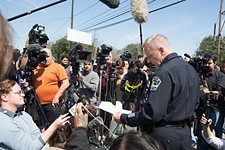Beside the Point: Everybody’s Got the Right
Concerning the fate of Mark Conditt’s confession
By Chase Hoffberger, Fri., April 13, 2018
Stephen Sondheim's musical Assassins opens at a fairground shooting gallery, and through the course of its first number introduces a series of characters who are central to the show. There's Leon Czolgosz, who shot and killed President William McKinley in 1901; followed by John Hinckley Jr., who tried to do the same to Ronald Reagan in 1981. Others from their club drop in: Charles Guiteau (James Garfield) and Giuseppe Zangara (FDR, attempted), Samuel Byck (Richard Nixon, also attempted), and Squeaky Fromme (Gerald Ford, same fate).
Toward the end of the procession comes John Wilkes Booth, famously the first to assassinate a sitting president when he shot Abe Lincoln in 1865. The gallery proprietor sees him coming.
"Hey, gang," he sings. "Look who's here. There's our Pioneer."
I haven't read Assassins since high school but find myself reminiscing about that scene over the past two weeks as I've considered the fate of the confessional tape the Austin Police Department (working with federal and state agencies) holds from Austin bomber Mark Conditt, and what sort of utility could come from its release. The confessional, a 25-minute recording found on Conditt's iPhone, has been requested via FOIA by more than 60 individuals, including representatives from national outlets like TMZ, People magazine, Inside Edition, and The New York Times. (No writers at the Chronicle filed a request, though 14 local reporters did. Should it be released, we'll listen to it roughly 30 minutes after they get it and post their story online.) City attorneys have appealed those requests to the state's attorney general, citing the ongoing investigation into the bombings and Conditt's conduct. But at a joint press conference Monday concerning the redacted release of a federal probable cause affidavit written to get Conditt under arrest, FBI Special Agent Chris Combs cited concerns his agency may have with any eventual release.
"When you look at past active shooters or mass murderers, what we find is they study the previous events," he said. "We find that sometimes these videos ... [are] inspirational for future people who are thinking about these acts." Combs said a number of Conditt's statements are of concern to the FBI. "We don't want that to live forever."
What's-a Wrong, Boy?
Though no one outside of law enforcement has heard the tape, we have learned a few things about it since its discovery on March 20.
We know that Conditt does not say he's sorry – that he wants to but he's not. We know, or can at least interpret, through the somewhat maligned words of interim Chief Brian Manley on March 21, that the confessional amounts to "the outcry of a very challenged young man talking about challenges in his personal life." We know – or can presume, based on what Manley said at that same press conference – that Conditt "does not at all mention anything about terrorism nor does he mention anything about hate." We know that Conditt spends a fair amount of time detailing the seven bombs he made – what went into them, and how they were produced – "with a level of specificity that he identified the differences" that could be found within each one.
That all known, I struggle to find the appeal of hearing what's on the tape. Is it to hear his lack of remorse? Not necessary: Conditt was clearly heartless, and is now dead. Or to learn about the bombs' construction? Hope not. When it comes to the finer points of malicious exploding packages, ignorance is often bliss.
Perhaps there's a desire to hear what's on the tape as a means of fact-checking Manley – to read into Conditt's words on one's own to determine whether there was any masked hate or motive, any expression of terror that local and federal law enforcement officials could not detect – and, because of the conditions of the case, to confirm that the white police chief wasn't providing political cover for the man he called a domestic terrorist one week after his death. Which would be one hell of a plank for Manley to walk out onto as he vies for appointment as permanent chief.
C'mere And Kill a President
It's hard to gauge how that would help heal things. As Mary Tuma wrote the other week (prior to Manley's amended classification of Conditt), the media should not need the police department's permission to call a right-wing radical who sent bombs to strangers of other races a domestic terrorist. Reading between the lines of a 25-minute confession won't change any of that. What are we going to do: get more mad that he delivered all those bombs?
But the negative effects are very real. We don't know the exact detail employed in describing the seven bombs, but just imagine: "I tied the wires as I did so that X and Y would happen in this way"; "I learned to rig each box so that it would detonate when it opened by reading Z."
This is the kind of stuff Combs and his colleagues don't want to get out, and I do concede they've got a point.
“Point Austin” is out to lunch for the next few weeks.
Got something to say on the subject? Send a letter to the editor.










